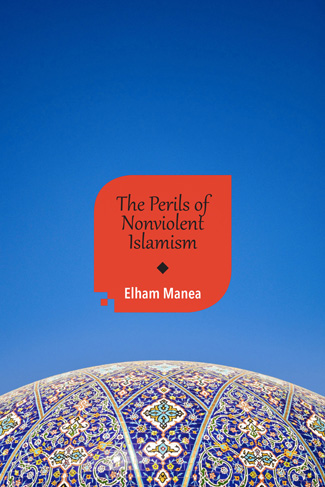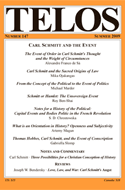By Telos Press · Thursday, March 11, 2021 To read more in depth from Telos, subscribe to the journal here.
Writing in the Wall Street Journal, Tunku Varadarajan talks with Elham Manea about Switzerland’s recent decision to prohibit the wearing of full facial coverings in public, thereby restricting the burqa and the niqab. Manea’s new book The Perils of Nonviolent Islamism, which investigates the broader context of this decision in comprehensive detail, is now available from Telos Press in our online store for 20% off the list price.
An excerpt from the article:
 European democracies differ from America’s in notable ways, and many Americans have reservations about the Swiss prohibition: Aren’t burqa bans an illiberal curbing of religious and expressive freedom? By some reports, fewer than 100 women in Switzerland wear the burqa. Do they constitute so great a threat to the venerable Swiss nation that their constitution, which guarantees freedom of faith and conscience, has to be amended to alter their sartorial practice? European democracies differ from America’s in notable ways, and many Americans have reservations about the Swiss prohibition: Aren’t burqa bans an illiberal curbing of religious and expressive freedom? By some reports, fewer than 100 women in Switzerland wear the burqa. Do they constitute so great a threat to the venerable Swiss nation that their constitution, which guarantees freedom of faith and conscience, has to be amended to alter their sartorial practice?
Aware that judgments from afar can sometimes be glib, I put these questions to Elham Manea, author of a book published last month titled The Perils of Nonviolent Islamism. . . . Ms. Manea is quick to dismiss the argument that the ban curbs freedom. You can’t separate the burqa and niqab from their “religious and political contexts” and turn this into “a simple question of ‘choice.'” The burqa didn’t “come out of nowhere” and Muslim women haven’t “decided to embrace it on a whim.” Many Western feminists, she says, tend to “neutralize the context, as if it is of no consequence.” She urges those who are squeamish about the ban to ask which ideology teaches women to cover themselves completely. What are its theological features? What does it say about women?
Continue reading →
By Telos Press · Tuesday, January 5, 2021 In today’s episode of the Telos Press Podcast, Camelia Raghinaru talks with Takahiro Nakajima about his article “Constitutionalism and Sovereignty: On Constitutional Problems in Japan,” from Telos 189 (Winter 2019). An excerpt of the article appears here. If your university has an online subscription to Telos, you can read the full article at the Telos Online website. For non-subscribers, learn how your university can begin a subscription to Telos at our library recommendation page. Purchase a print copy of Telos 189 in our online store.
Listen to the podcast here.
Continue reading →
By Telos Press · Thursday, December 17, 2020 In today’s episode of the Telos Press Podcast, Camelia Raghinaru talks with Greg Melleuish about his article “Constitution and Culture: The Unusual Case of Australia,” from Telos 189 (Winter 2019). An excerpt of the article appears here. If your university has an online subscription to Telos, you can read the full article at the Telos Online website. For non-subscribers, learn how your university can begin a subscription to Telos at our library recommendation page. Purchase a print copy of Telos 189 in our online store.
Listen to the podcast here.
Continue reading →
By Erik Pomrenke · Tuesday, September 26, 2017 As an occasional feature on TELOSscope, we highlight a past Telos article whose critical insights continue to illuminate our thinking and challenge our assumptions. Today, Erik Pomrenke looks at Adam Kotsko’s “On Agamben’s Use of Benjamin’s ‘Critique of Violence'” from Telos 145 (Winter 2008).
“On Agamben’s Use of Benjamin’s ‘Critique of Violence'” represents an illuminating attempt by Adam Kotsko to reassert the primacy of Walter Benjamin over Carl Schmitt in Giorgio Agamben’s work. These two thinkers serve alongside Heidegger, Aristotle, Foucault, and Arendt as the center of Agamben’s genealogy of bare life; as such, configuring this constellation correctly is of signal importance to the reception of Agamben’s Homo Sacer project. Kotsko contends that Benjamin’s primacy is both a theoretical and chronological matter.
Continue reading →
By Beau Mullen · Friday, February 24, 2017
This paper focuses on the modern practice of using law, both national and international, to achieve policy goals and political ends that usually are the result of tactical military action. Lawfare, as this practice is referred to, is now a crucial tactic in the modern era of international relations, where war is largely carried out in a far from traditional manner. Lawfare, then, is a unique form of irregular warfare that can be employed by nations against one another and against insurgents in asymmetrical conflicts at home and abroad. This new reliance on irregular and asymmetrical warfare generally and lawfare specifically is reflective of Hegel’s view of the end of history, particularly as articulated by Alexandre Kojève. Basically, that as individuals gain equal recognition, the mode of satisfying desire will necessarily take the form of law and bureaucracy.
Continue reading →
By Beau Mullen · Tuesday, January 20, 2015  Central to Carl Schmitt’s geophilosophy is his view that law is intrinsically linked to the physical location. This connection between the terra firma and the law is an essential element of what he refers to as nomos. Schmitt sees this as the most authentic form of law, distinguishable from views that perceive law as a normative or positive regime. In his article “Carl Schmitt and the Sacred Origins of Law,” Mika Ojakangas elucidates Schmitt’s conception of nomos, its relation to Schmitt’s view of mythopolitical legitimization of the state, and the consequences of rejecting the notion of such a link by secularization. Central to Carl Schmitt’s geophilosophy is his view that law is intrinsically linked to the physical location. This connection between the terra firma and the law is an essential element of what he refers to as nomos. Schmitt sees this as the most authentic form of law, distinguishable from views that perceive law as a normative or positive regime. In his article “Carl Schmitt and the Sacred Origins of Law,” Mika Ojakangas elucidates Schmitt’s conception of nomos, its relation to Schmitt’s view of mythopolitical legitimization of the state, and the consequences of rejecting the notion of such a link by secularization.
Continue reading →
|
|
European democracies differ from America’s in notable ways, and many Americans have reservations about the Swiss prohibition: Aren’t burqa bans an illiberal curbing of religious and expressive freedom? By some reports, fewer than 100 women in Switzerland wear the burqa. Do they constitute so great a threat to the venerable Swiss nation that their constitution, which guarantees freedom of faith and conscience, has to be amended to alter their sartorial practice?
 Central to Carl Schmitt’s geophilosophy is his view that law is intrinsically linked to the physical location. This connection between the terra firma and the law is an essential element of what he refers to as nomos. Schmitt sees this as the most authentic form of law, distinguishable from views that perceive law as a normative or positive regime. In his article “Carl Schmitt and the Sacred Origins of Law,” Mika Ojakangas elucidates Schmitt’s conception of nomos, its relation to Schmitt’s view of mythopolitical legitimization of the state, and the consequences of rejecting the notion of such a link by secularization.
Central to Carl Schmitt’s geophilosophy is his view that law is intrinsically linked to the physical location. This connection between the terra firma and the law is an essential element of what he refers to as nomos. Schmitt sees this as the most authentic form of law, distinguishable from views that perceive law as a normative or positive regime. In his article “Carl Schmitt and the Sacred Origins of Law,” Mika Ojakangas elucidates Schmitt’s conception of nomos, its relation to Schmitt’s view of mythopolitical legitimization of the state, and the consequences of rejecting the notion of such a link by secularization. 

